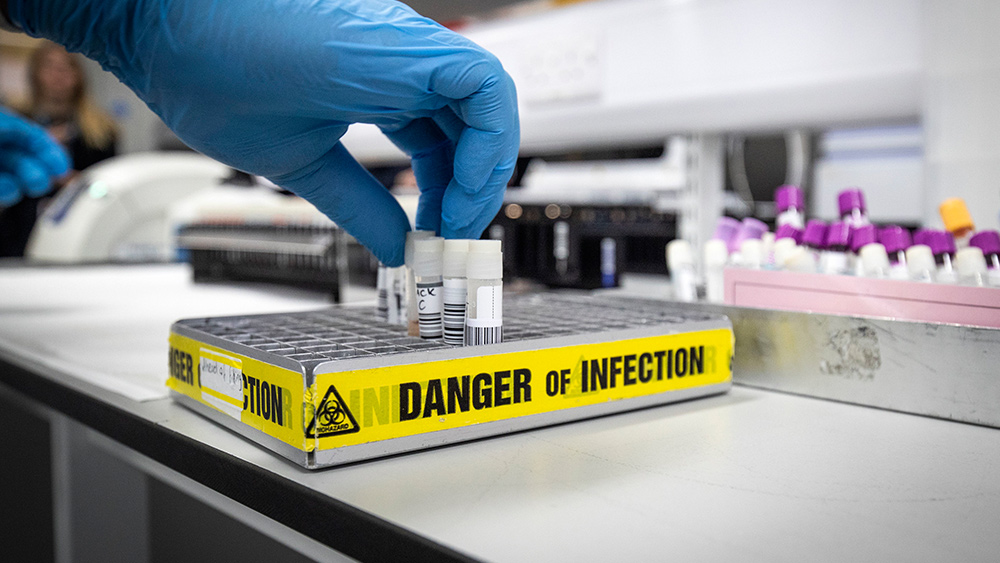 Parler
Parler Gab
Gab
- Microplastics in seafood, supplements and ultra-processed foods are linked to higher dementia risk, according to studies.
- Higher consumption of ultra-processed foods accelerates cognitive decline, per JAMA Neurology.
- Toxin accumulation in brains increases with time, worsening in those with dementia (2024 study).
- Small fish, clean sources and whole foods reduce microplastic intake.
- Dietary shifts to natural foods may cut dementia risk by nearly 20%, experts say.
Microplastics: The stealth invader in your brain
Microplastics, the tiny fragments of plastic ingested through food and water, are silently infiltrating brain tissue, with alarming consequences. A groundbreaking study published in Nature Medicine analyzed brain samples from deceased adults, finding higher microplastic levels in those with dementia. The particles, particularly polyethylene, were prevalent in cerebral tissues, including vascular walls and immune cells, suggesting a direct pathway to neurodegeneration. Zhao Mingwei, a toxicologist at the American Society of Toxicology, explained, “Once too much accumulates, the risk of dementia will increase.” Tiny enough to bypass the blood-brain barrier, these particles disrupt neural function, spurring beta-amyloid plaque formation—a hallmark of Alzheimer’s. The sources:- Seafood, especially coastal fish and large predators like tuna, absorb microplastics from polluted waters.
- Health supplements, especially in capsule form, contribute to ingestion. “Even probiotic pills often contain plastic pollutants,” Zhao warned.
Ultra-processed foods: A cognitive slow-motion disaster
Beyond microplastics, ultra-processed foods (UPFs)—such as sodas, frozen meals and store-bought snacks—are fueling a global health crisis. A JAMA Neurology study tracking 10,000 Brazilians found UPFs accounting for over 20% of daily calories accelerated cognitive decline, worsening executive function over eight years. “Ultra-processed foods mimic nature but contain artificial additives that disrupt brain chemistry,” Zhao stated. These products, often loaded with refined sugars, unhealthy fats and preservatives, trigger inflammation and oxidative stress. Early research even links UPFs to higher dementia risk in adults younger than 60. Hidden dangers:- Fake ingredients: “Plant-based meats” and “fruit spreads” may derive from genetically altered corn or soy, masquerading as natural foods.
- Processing harm: Excessive refining alters nutrients, creating toxins during manufacturing (e.g., acrylamide in chips).
The supplementation paradox: Pills for health—or plastic poison?
Even health-conscious consumers face risks. Zhao highlighted that capsule-based supplements, a staple for aging populations, expose users to microplastics from gelatin coatings and fillers. Over time, tiny doses of plastic could accumulate in the brain, outweighing benefits of vitamins or minerals inside. Safer alternatives:- Opt for powdered supplements or liquid extracts in glass bottles.
- Choose “clean-label” brands with certifications like ISO or GMP to minimize contamination.
A dietary revival for brain health
The good news? Studies show reversing these risks is within reach. Research via the UK Biobank found substituting just 10% of UPFs with whole foods (e.g., fruits, nuts, lean proteins) reduces dementia risk by 19%. Zhao advocates:- Seafood strategy: Choose small fish (e.g., sardines) over largemouth bass, and avoid eating visceral organs where toxins concentrate.
- Whole-food focus: Replace UPFs with fresh produce and legumes to boost antioxidants and reduce toxin exposure.
The future of brain health starts at the table
The interplay between modern diets and cognitive decline paints a stark picture but offers solace in actionable change. As Zhao summarized, “The choices we make today may prevent suffering decades later.” With microplastics and UPFs now established as threats to neural health, whole foods are no longer just a lifestyle preference—they’re a lifeline for future generations. Sources for this article include: TheEpochTimes.com Nature.com Healio.com AlzInfo.orgUndeclared meat ingredients trigger massive recall amid growing food safety concerns
By Willow Tohi // Share
Pomegranate’s performance-boosting potential confirmed
By News Editors // Share
Dr. Carrie Madej ordered to pay $1.3M for negligence and wrongful death
By Ramon Tomey // Share
Governments continue to obscure COVID-19 vaccine data amid rising concerns over excess deaths
By patricklewis // Share
Tech giant Microsoft backs EXTINCTION with its support of carbon capture programs
By ramontomeydw // Share
Germany to resume arms exports to Israel despite repeated ceasefire violations
By isabelle // Share










